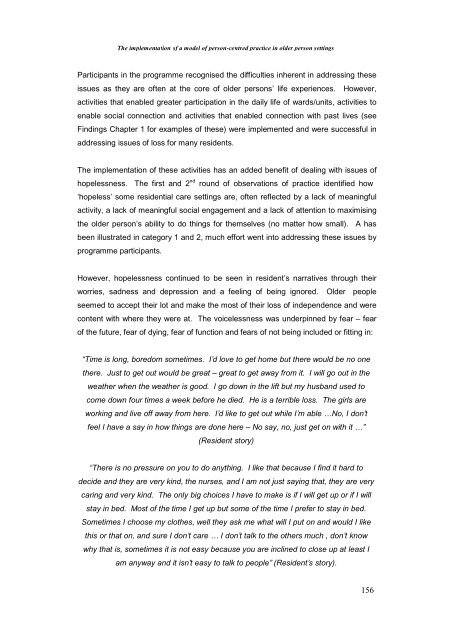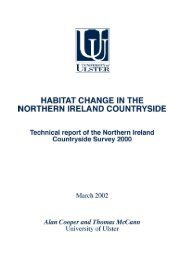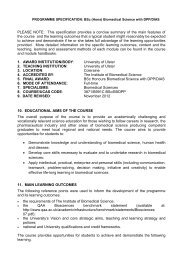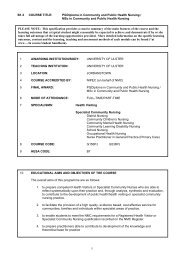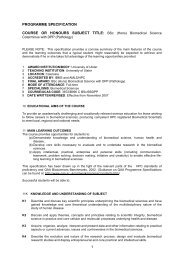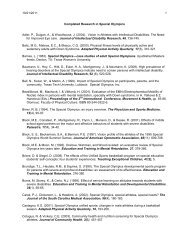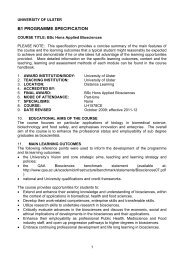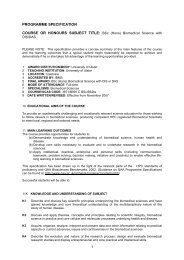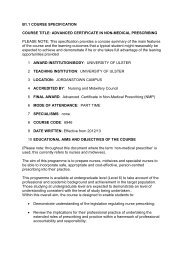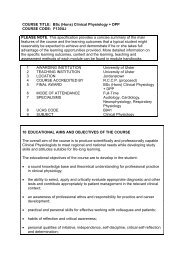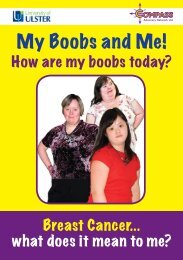The Implementation of a Model of Person-Centred Practice In Older ...
The Implementation of a Model of Person-Centred Practice In Older ...
The Implementation of a Model of Person-Centred Practice In Older ...
Create successful ePaper yourself
Turn your PDF publications into a flip-book with our unique Google optimized e-Paper software.
<strong>The</strong> implementation <strong>of</strong> a model <strong>of</strong> person-centred practice in older person settings<br />
Participants in the programme recognised the difficulties inherent in addressing these<br />
issues as they are <strong>of</strong>ten at the core <strong>of</strong> older persons’ life experiences. However,<br />
activities that enabled greater participation in the daily life <strong>of</strong> wards/units, activities to<br />
enable social connection and activities that enabled connection with past lives (see<br />
Findings Chapter 1 for examples <strong>of</strong> these) were implemented and were successful in<br />
addressing issues <strong>of</strong> loss for many residents.<br />
<strong>The</strong> implementation <strong>of</strong> these activities has an added benefit <strong>of</strong> dealing with issues <strong>of</strong><br />
hopelessness. <strong>The</strong> first and 2 nd round <strong>of</strong> observations <strong>of</strong> practice identified how<br />
‘hopeless’ some residential care settings are, <strong>of</strong>ten reflected by a lack <strong>of</strong> meaningful<br />
activity, a lack <strong>of</strong> meaningful social engagement and a lack <strong>of</strong> attention to maximising<br />
the older person’s ability to do things for themselves (no matter how small). A has<br />
been illustrated in category 1 and 2, much effort went into addressing these issues by<br />
programme participants.<br />
However, hopelessness continued to be seen in resident’s narratives through their<br />
worries, sadness and depression and a feeling <strong>of</strong> being ignored. <strong>Older</strong> people<br />
seemed to accept their lot and make the most <strong>of</strong> their loss <strong>of</strong> independence and were<br />
content with where they were at. <strong>The</strong> voicelessness was underpinned by fear – fear<br />
<strong>of</strong> the future, fear <strong>of</strong> dying, fear <strong>of</strong> function and fears <strong>of</strong> not being included or fitting in:<br />
“Time is long, boredom sometimes. I’d love to get home but there would be no one<br />
there. Just to get out would be great – great to get away from it. I will go out in the<br />
weather when the weather is good. I go down in the lift but my husband used to<br />
come down four times a week before he died. He is a terrible loss. <strong>The</strong> girls are<br />
working and live <strong>of</strong>f away from here. I’d like to get out while I’m able …No, I don’t<br />
feel I have a say in how things are done here – No say, no, just get on with it …”<br />
(Resident story)<br />
“<strong>The</strong>re is no pressure on you to do anything. I like that because I find it hard to<br />
decide and they are very kind, the nurses, and I am not just saying that, they are very<br />
caring and very kind. <strong>The</strong> only big choices I have to make is if I will get up or if I will<br />
stay in bed. Most <strong>of</strong> the time I get up but some <strong>of</strong> the time I prefer to stay in bed.<br />
Sometimes I choose my clothes, well they ask me what will I put on and would I like<br />
this or that on, and sure I don’t care … I don’t talk to the others much , don’t know<br />
why that is, sometimes it is not easy because you are inclined to close up at least I<br />
am anyway and it isn’t easy to talk to people” (Resident’s story).<br />
156


